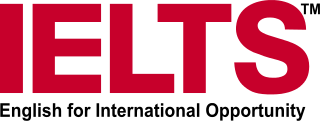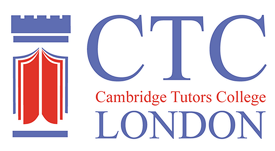
International English Language Testing System is an international standardized test of English language proficiency for non-native English language speakers. It is jointly managed by the British Council, IDP and Cambridge English, and was established in 1989. IELTS is one of the major English-language tests in the world. The IELTS test has two modules: Academic and General Training. IELTS One Skill Retake was introduced for computer-delivered tests in 2023, which allows a test taker to retake any one section of the test.

English as a second or foreign language refers to the use of English by individuals whose native language is different, commonly among students learning to speak and write English. Variably known as English as a foreign language (EFL), English as a second language (ESL), English for speakers of other languages (ESOL), English as an additional language (EAL), or English as a new language (ENL), these terms denote the study of English in environments where it is not the dominant language. Programs such as ESL are designed as academic courses to instruct non-native speakers in English proficiency, encompassing both learning in English-speaking nations and abroad.

CELTA is an initial teacher training qualification for teaching English as a second or foreign language (ESL and EFL). It is provided by Cambridge Assessment English through authorised Cambridge English Teaching Qualification centres and can be taken either full-time or part-time. CELTA was developed to be suitable both for those interested in Teaching English as a Foreign Language (TEFL) and for Teaching English to the Speakers of Other Languages (TESOL). The full name of the course was originally the Certificate in English Language Teaching to Adults and is still referred to in this way by some course providers. However, in 2011 the qualification title was amended on the Ofqual register to the Cambridge English Level 5 Certificate In Teaching English to Speakers of Other Languages (CELTA) in order to reflect the wider range of students that teachers might have, including younger learners.
Cambridge Assessment English or Cambridge English develops and produces Cambridge English Qualifications and the International English Language Testing System (IELTS). The organisation contributed to the development of the Common European Framework of Reference for Languages (CEFR), the standard used around the world to benchmark language skills, and its qualifications and tests are aligned with CEFR levels.
St Clare's is a coeducational private, international day and boarding college in North Oxford, England offering the International Baccalaureate Diploma, a Preparatory IB programme, English language courses, University Pathways, Gap Year study and IB teacher training workshops.
DELTA is an English language teaching (ELT) qualification for experienced Teachers of English as a Foreign Language (TEFL) and Teachers of English to Speakers of Other Languages (TESOL). It is provided by Cambridge English Language Assessment through authorised Cambridge English Teaching Qualification centres and can be taken either full-time or part-time. The full name of the course was originally the Diploma in English Language Teaching to Adults and is still referred to in this way by some course providers. However, in 2011 the qualification title was amended on the Ofqual register to the Cambridge English Level 7 Diploma In Teaching English to Speakers of Other Languages (DELTA) in order to reflect that the wider range of students that teachers might have, including younger learners.
The Certificate in TESOL (CertTESOL) is an accredited professional qualification awarded in the teaching of "English for speakers of other languages" (ESOL) by Trinity College London. It is a commonly taken teaching qualification in the field of English language learning and teaching (ELT). It is one of various TEFL qualifications available. The Trinity CertTESOL is regulated by the UK's Office of Qualifications and Examinations Regulation (Ofqual) which regulates qualifications, examinations and assessments in England.
The Licentiate Diploma in TESOL, also known as LTCL DipTESOL, is a professional qualification awarded in the teaching of English for Speakers of Other Languages (ESOL) by Trinity College London. It is an advanced teaching qualification, often seen as a follow-up to the CertTESOL, and is accredited in England by the Qualifications and Curriculum Authority at Level 7 on the UK National Qualifications Framework as are master's degrees in related subject areas. Holders of the LTCL DipTESOL are also eligible for credit transfer on some master's degree programs.
The Independent Schools Inspectorate (ISI) is approved by the Secretary of State for Education – under section 106 of the Education and Skills Act 2008 – to inspect private schools in England. These schools are members of associations, which form the Independent Schools Council.
Shafston International College is a private education institution for international students located in Brisbane and the Gold Coast, Queensland, Australia. It offers vocational training, Adult English language programs, High School Preparation, Study Tour and University Pathway programs. In November 2020, it was announced that Shafston would temporarily close, with the building and contents to be auctioned. In the mid of 2021, Shafston International College has completed the ownership transition and re-open the campus to the international market.
C1 Advanced, previously known as Cambridge English: Advanced and the Certificate in Advanced English (CAE), is an English language examination provided by Cambridge Assessment English (previously known as Cambridge English Language Assessment and the University of Cambridge ESOL examination).
Trinity College London ESOL is an international English Language examinations board delivering assessments in English language learning and teaching and has been offering English language examinations since 1938. Trinity College London's exams are taken by over 850,000 candidates in over 60 countries each year.

Trinity College London (TCL) is an examination board based in London, United Kingdom which offers graded and diploma qualifications across a range of disciplines in the performing arts and English language learning and teaching. Trinity College London has examined over 850,000 candidates in more than 60 countries worldwide. It is a registered charity in England, Wales and Scotland, and its Patron is HRH The Duke of Kent.

Cambridge Tutors College is a private school and sixth form situated in South Croydon, outer London. It was founded in 1958 as a tutorial centre to help boys prepare for their Common Entrance Examination. Students come from over twenty countries, including China, Malaysia, Thailand, Vietnam, Singapore, Myanmar, the Baltics, Balkans, Nigeria, Russia, Ukraine and Kazakhstan.
British Study Centres (BSC) is a group of English language schools consisting of eight adult language schools and seventeen junior centres, including the City Football Language School in partnership with Manchester City, with the majority of schools and centres based in the UK. The head office is located in Brighton & Hove, East Sussex. Today, British Study Centres (BSC) specialises in English language training for adults and young learners, teacher training courses for UK and overseas teachers and University Pathway programmes in partnership with NCUK.
TESOL Quarterly is a quarterly peer-reviewed academic journal published by Wiley-Blackwell on behalf of TESOL International Association. It covers English language teaching and learning, standard English as a second dialect, including articles on the psychology and sociology of language learning and teaching, professional preparation, curriculum development, and testing and evaluation. The editors-in-chief are Charlene Polio and Peter De Costa, both at Michigan State University. TESOL also publishes TESOL Journal.

ELC English Language Center is a privately operated group of boutique language schools that provide English language training in the United States. It operates through various language centers, in Los Angeles, Boston and Santa Barbara. ELC opened its first center in 1978. ELC has been accredited by ACCET. ELC Los Angeles, ELC Boston, and ELC Santa Barbara are all authorized by the US Department of Homeland Security to Issue SEVIS Form I-20. ELC is often used by international students to improve their English for gap year study, career transitions, or to prepare for study at a U.S. university. ELC has a proprietary curriculum, which has a structure that accommodates multi-level placement, and 12 levels of instruction. Certain locations also offer TOEFL, IELTS and Cambridge ESOL preparation and testing. ELC Los Angeles and ELC Boston are both authorized IELTS test centers. ELC is owned and operated in the United States.

Harris Academy Orpington is a non-selective secondary school and sixth form with academy status in Orpington in the London Borough of Bromley which joined the Harris Federation in September 2016.
Teaching English as a second (TESL) orforeign language (TEFL) and teaching English to speakers of other languages (TESOL) are terms that refer to teaching English to students whose first language is not English. The terms TEFL, TESL, and TESOL distinguish between a class's location and student population, and have become problematic due to their lack of clarity. TEFL refers to English-language programs conducted in countries where English is not the primary language, and may be taught at a language school or by a tutor. For some jobs, the minimum TEFL requirement is a 100-hour course; the 120-hour course is recommended, however, since it may lead to higher-paid teaching positions. TEFL teachers may be native or non-native speakers of English.
An English language institute (ELIs) or English language centre (ELCs) is a department within a college or university in English-speaking countries that aims to develop students' English language skills for a variety of purposes. In countries like New Zealand, ELCs accounted for one-fifth of the $1.1 billion (NZ) in revenue (2001).







